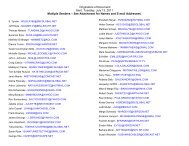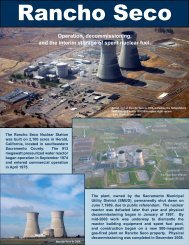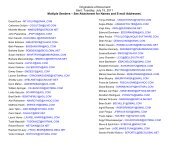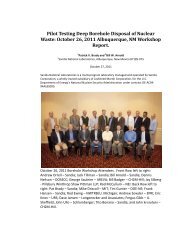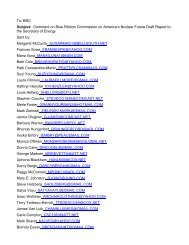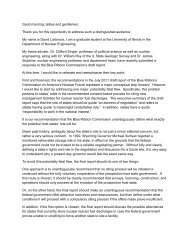Parametric Study of Front-End Nuclear Fuel Cycle Costs Using ...
Parametric Study of Front-End Nuclear Fuel Cycle Costs Using ...
Parametric Study of Front-End Nuclear Fuel Cycle Costs Using ...
You also want an ePaper? Increase the reach of your titles
YUMPU automatically turns print PDFs into web optimized ePapers that Google loves.
fuel. Utilizing the methodology outlined in EPRI report 1018574, this study calculates uranium<br />
requirements for the fabrication <strong>of</strong> reload fuel for a PWR utilizing RepU and compares this to the<br />
requirements for a reload <strong>of</strong> PWR fuel using natural uranium.<br />
This study includes a parametric analysis <strong>of</strong> LWR fuel cycle costs using RepU and compares<br />
those costs to LWR fuel cycle costs using natural uranium ore concentrates in order to determine<br />
the impact <strong>of</strong> changes in front-end fuel cycle unit costs, including costs associated with<br />
processing RepU, on decisions regarding whether to utilize RepU inventories in the fabrication<br />
<strong>of</strong> LWR fuel.<br />
Results<br />
Over the range <strong>of</strong> unit costs evaluated in this report, uranium ore concentrates and uranium<br />
enrichment services represent approximately 90% <strong>of</strong> overall nuclear fuel cycle costs when<br />
natural uranium is utilized to manufacture LWR fuel. Decisions regarding whether to recycle<br />
RepU in the place <strong>of</strong> natural uranium ore concentrates in LWR fuel will depend upon economic<br />
factors, such as the unit cost <strong>of</strong> uranium ore concentrates, the need for higher enrichment assays<br />
to compensate for neutron absorbing isotopes in RepU, the premium associated with converting<br />
the RepU to uranium hexafluoride (UF 6<br />
) and then enriching it, and the physical characteristics <strong>of</strong><br />
the RepU (such as the initial 235 U assay). In addition, there are technical issues that must be<br />
addressed, such as those associated with the licensing and use <strong>of</strong> RepU in reactor cores, and the<br />
need for additional worker protection measures during the processing and manufacture <strong>of</strong> RepU<br />
fuel. If the cost premium associated with the processing <strong>of</strong> RepU, relative to the cost <strong>of</strong><br />
processing natural uranium concentrates, can be minimized, and depending upon the unit cost <strong>of</strong><br />
natural uranium concentrates, it may be beneficial to consider recycling RepU for use in LWRs<br />
in the place <strong>of</strong> natural uranium.<br />
EPRI Perspective<br />
This report is a follow-on study to EPRI report 1018574, <strong>Parametric</strong> <strong>Study</strong> <strong>of</strong> <strong>Front</strong>-<strong>End</strong> <strong>Nuclear</strong><br />
<strong>Fuel</strong> <strong>Cycle</strong> <strong>Costs</strong>. The present report is intended to provide a source <strong>of</strong> baseline cost information<br />
for decisions that consider the recycling <strong>of</strong> RepU inventories in LWR fuel, displacing natural<br />
uranium ore concentrates.<br />
Keywords<br />
Conversion<br />
Enrichment<br />
Fabrication<br />
Recycling<br />
Reprocessed uranium<br />
vi


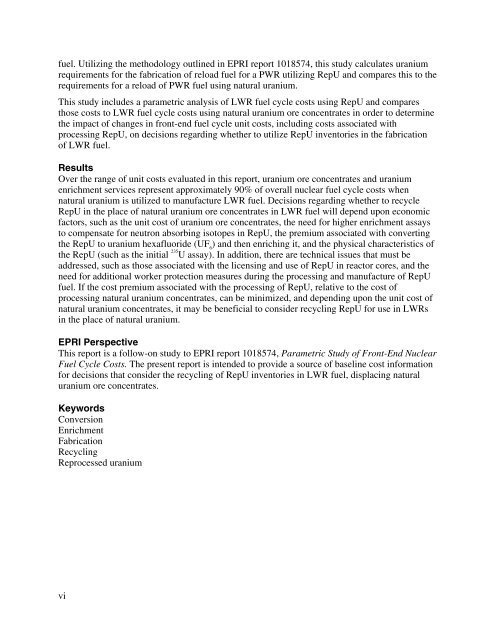
![Rainer Schottlaender[SMTP:RAINER.SCHOTTLAENDER@WEB.DE]](https://img.yumpu.com/51418350/1/190x245/rainer-schottlaendersmtprainerschottlaenderwebde.jpg?quality=85)
